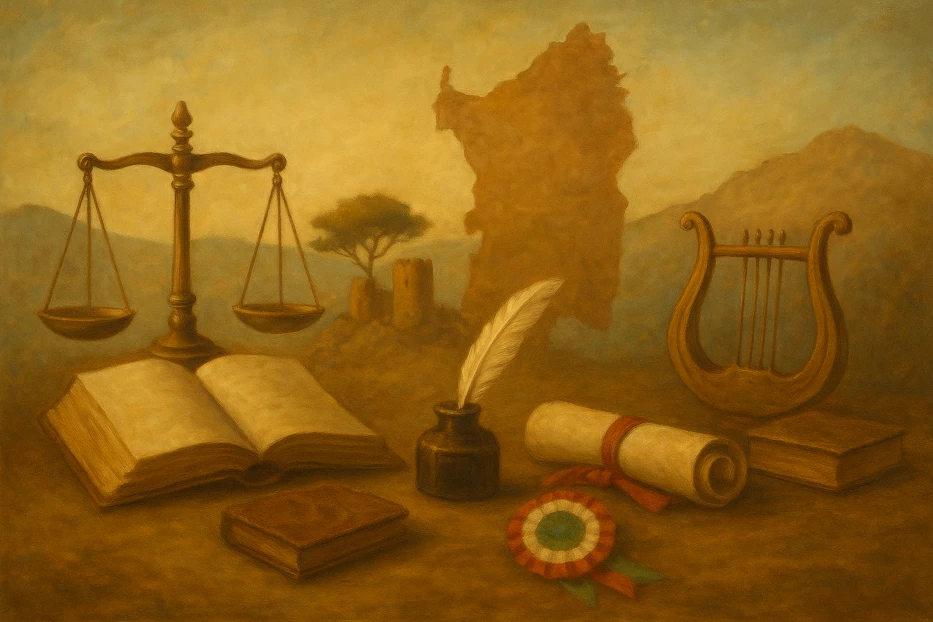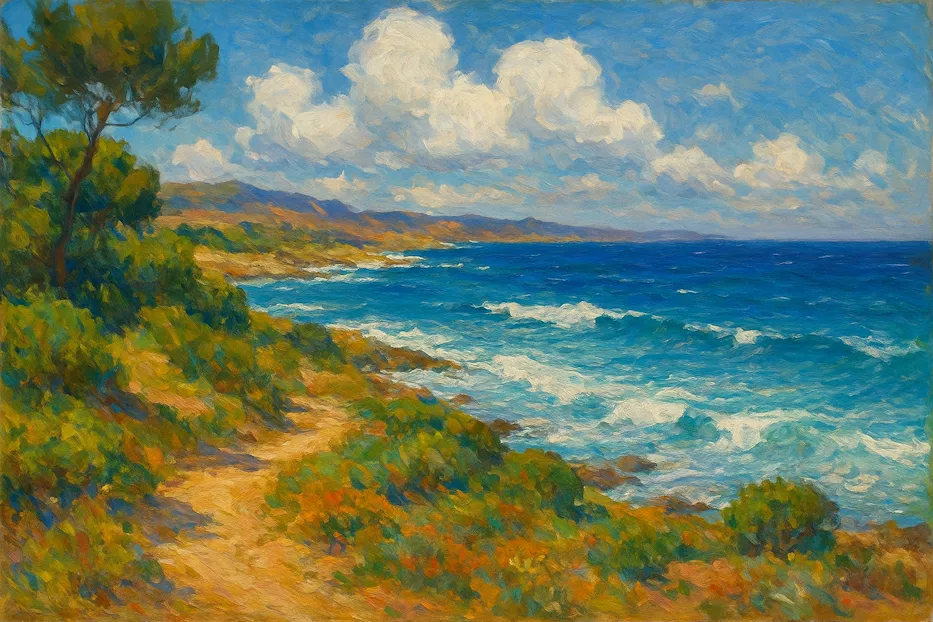Famous Sardinians who changed history stand as proof that this island, often reduced to its coastline and cuisine, has long produced individuals who reshaped the world around them.
Sardinia’s mountains and mistral winds have shaped a particular kind of intelligence — austere, resistant, lyrical. From that landscape, we choose five. Out of its granite villages came a queen who codified justice, a poet who defied blindness, a writer who earned a Nobel, a revolutionary who challenged kings, and a philosopher whose prison notebooks changed how we think about power.
Their stories are not about nostalgia. They are the story of Sardinia itself: a place perpetually negotiating between independence and influence, myth and modernity.
Table of Contents
Grazia Deledda — The Self-Taught Nobel Laureate
When Grazia Deledda was born in Nuoro in 1871, Sardinia was a periphery of a newly unified Italy — mountainous, rural, inward. Out of that isolation, Deledda taught herself languages, devoured the classics, and began to write stories about her homeland’s inner weather: pride, guilt, faith, and the slow rhythm of survival.
Her 1913 novel Canne al vento (Reeds in the Wind) distilled the island’s fatalism into art so precise that, in 1926, she became the first Italian woman to win the Nobel Prize in Literature. Deledda’s work captured Sardinia before the tourists, before the ferries — a moral landscape where tradition itself was both refuge and curse.
Visiting Casa Deledda in Nuoro today, you can still see her desk overlooking the hills she turned into myth. Her achievement was not simply literary; it was existential. She proved that a voice born in silence could echo across the world — one of many famous Sardinians who changed history by showing that geography need not limit greatness.
Antonio Gramsci — The Mind in Exile
Born two decades later in 1891 in the small town of Ales, Antonio Gramsci would transform how the world understands power. Sickly, impoverished, and Sardinian to his core, he grew up aware of the invisible hierarchies that divide “mainland” and “island,” privilege and poverty.
As a founder of Italy’s Communist Party, Gramsci was imprisoned by Mussolini’s regime in 1926. It was in confinement that he wrote his Prison Notebooks, a series of meditations that redefined political philosophy. His concept of cultural hegemony — that dominance is maintained through culture and language, not only through coercion — remains foundational to modern thought.
His ideas were born not in the salons of Turin, but in the awareness of exclusion he first felt as a Sardinian. At the Casa Museo Gramsci in Ghilarza, his childhood home of basalt and silence still stands, its austerity mirroring his discipline. Gramsci’s intellect was forged from distance, his rebellion from empathy. Among famous Sardinians who changed history, he is the thinker who gave exile its own power.
Eleonora of Arborea — The Lawgiver Queen
Centuries before Deledda or Gramsci, another Sardinian defied expectation with pen and power. Eleonora of Arborea, born in the 14th century, ruled the last independent Sardinian kingdom at a time when women rarely ruled anything.
When her brother and husband died, Eleonora assumed the regency of the Judicate of Arborea, holding off invasion by the Crown of Aragon. Her most lasting legacy was the Carta de Logu, a legal code written in Sardinian that blended Roman, Byzantine, and local traditions. It granted unprecedented rights to women, the poor, and even animals — a humane charter that endured until the 19th century.
In Oristano’s Piazza Eleonora, her statue presides in marble composure, her gaze turned toward a future she helped design. For modern Sardinians, she remains the embodiment of measured strength: both ruler and reformer, as pragmatic as she was visionary. Among famous Sardinians who changed history, Eleonora stands first in time and, arguably, in spirit.
Giovanni Maria Angioy — The Revolutionary Judge
When Enlightenment ideas reached Sardinia in the late 18th century, few dared act on them. Giovanni Maria Angioy, a judge from Bono, did. Frustrated by the island’s feudal system and the indifference of the Savoy monarchy, Angioy led a movement for equality, justice, and local autonomy.
In 1794, his revolt swept across towns from Cagliari to Sassari, inspired by the cry for self-rule. But the French Revolution’s idealism met the hard rock of local politics: betrayed by allies and hunted by the crown, Angioy fled into exile, dying in Paris in 1808.
Today his name marks streets and schools, his portrait hangs in provincial chambers, and his ideals — liberty, equality, self-determination — remain touchstones for Sardinian identity. His route from Bono to Sassari is more than geography; it’s a map of conscience. Angioy was one of the famous Sardinians who changed history by reminding an island that freedom, once imagined, cannot be forgotten.
Melchiorre Murenu — The Blind Poet of Protest
If Deledda gave Sardinia its literary voice, Melchiorre Murenu gave it its fury. Born in 1803 in Macomer, blind from childhood, Murenu composed verses that lashed out against injustice, greed, and hypocrisy.
His poetry — performed orally in the Sardinian language — was as much journalism as art. In S’istadu de Sardigna (“The State of Sardinia”), he accused the island’s elites of corruption and neglect. The words spread by memory, not print, across villages and fields. His satire was so sharp that legend claims he was murdered for it.
Murenu remains a local hero precisely because his voice was not polished but raw. He spoke in the rhythms of shepherds and farmers, crafting a populist literature before the term existed. Among famous Sardinians who changed history, Murenu endures as the conscience of the people — proof that protest can rhyme.
The Island That Shapes Its People
To trace these five famous Sardinians who changed history is to see the island itself reflected through them: stubborn, self-contained, luminous. Sardinia’s landscape resists haste. Its interior — the Barbagia, the Gennargentu mountains, the nuraghe stones that predate Rome — cultivates endurance. That same endurance runs through Eleonora’s reforms, Deledda’s sentences, Gramsci’s theories, Murenu’s verses, and Angioy’s revolt.
Each of them, in their own way, turned marginality into a form of strength. Sardinia’s isolation has never meant silence. It has meant the freedom to think differently: to imagine justice centuries early, to speak inconvenient truths, to write from the edge and reach the center.
The island continues to produce artists, athletes, and thinkers of rare distinction, but these five remain its compass points. They remind visitors that Sardinia’s grandeur lies not only in its coastline, but in the minds and spirits it has forged.
If You Go
Those drawn to the legacy of famous Sardinians who changed history can follow it in physical space:
- Nuoro: Visit Casa Deledda and the Museo del Costume to see the textures that filled her fiction.
- Ghilarza: Explore Casa Gramsci, where notebooks and letters evoke the philosopher’s quiet discipline.
- Oristano: Stand before Piazza Eleonora’s statue and read the Carta de Logu excerpts nearby.
- Bono and Sassari: Trace Giovanni Maria Angioy’s Trail (Il Cammino di Angioy), a hiking route inspired by his revolutionary journey.
- Macomer: Attend poetry festivals that keep Murenu’s language alive.
Each stop reveals how Sardinia’s landscape still converses with its history — rugged, resistant, and entirely its own.
The Enduring Legacy
In the end, what unites these famous Sardinians who changed history is not ideology or era, but temperament: a refusal to remain silent. Their defiance, quiet or overt, continues to shape the island’s sense of itself.
Sardinia has always been an island apart: physically detached from Italy, emotionally detached from conformity. That distance breeds a rare kind of genius: born of constraint, refined by endurance, and expressed in beauty that feels both ancient and unrepeatable.
The world tends to see Sardinia in postcards: turquoise bays, olive groves, endless summer. But the island’s true inheritance lives in these five lives, among others: a queen’s code, a poet’s defiance, a writer’s solitude, a thinker’s endurance, a rebel’s fire. Together, they remind us that history is not written by empires alone; sometimes it begins on an island shaped by wind.


